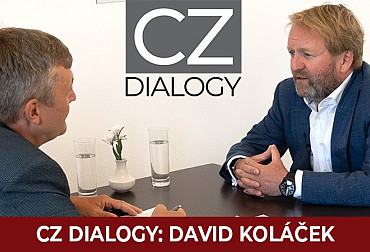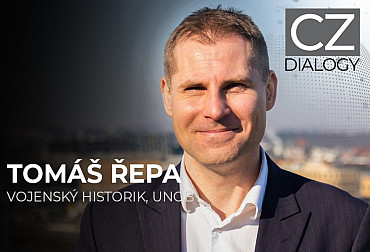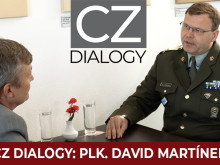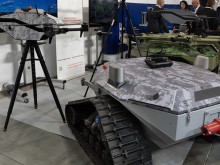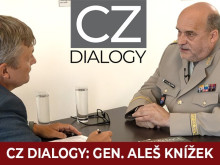Gen. Petr Čepelka: Training of pilots is a key component in developing the Czech Air Force
The Future Forces Forum is an international expert platform for discussing trends and technologies in defense and security. It provides a unique space for expert discussions and presentations, incorporating the latest knowledge to counter future threats. The primary objective is to develop security and defense cooperation within NATO, the European Union, and with other partner countries and both military and civilian authorities. The event features numerous expert conferences and discussion panels.
Video: Interview with President of the Czech Republic Petr Pavel and Commander of the Czech Air Force Major General Petr Čepelka / CZ DEFENCE
The Future Forces Forum (FFF) also includes an exhibition of advanced technologies and solutions for ensuring national and global security. The exhibition highlights current and future needs of the armed and security forces, showcases the latest technologies, and promotes development and innovation programs. Its aim is to engage all relevant stakeholders, including government, local authorities, international organizations, users, manufacturers, and developers. This year's event focused on the state's preparedness for both conventional and unconventional threats, the use of groundbreaking technologies, and modernization and armament projects for the Czech Armed Forces, police, fire brigade, prison service, and other IRS components. CZ DEFENCE magazine recorded a series of interviews at the Future Forces Forum, capturing numerous insights. First, we feature an interview with the President of the Czech Republic, Petr Pavel, and Major General Petr Čepelka, Commander of the Czech Air Force.
Future Forces Forum is an international expert platform for trends and technologies in defence and security. It is a unique space for expert discussions and presentations using the latest knowledge to combat future threats. The primary objective is to develop security and defence cooperation within NATO, the European Union and cooperation with other partner countries and military and civilian authorities. The event features a large number of expert conferences and discussion panels. "When we look at today's conflicts, we see that traditional ways of conducting military activity have not only not disappeared, but are now much more effective and efficient. But they are joined by new technologies that, until recently, had little to do with the military. Let us look, for example, at developments in the field of drones in Ukraine. We are not talking about years here, or even months. Here we can say that the situation is evolving from week to week and whoever is able to master the new technologies will very likely dominate the battlefield," the President responded.
According to him, the role is not only that of an attacker but also that of a defender. That is why he also recalled the role of the North Atlantic Alliance as a defence pact. "We are not interested in having our technologies dominate anyone, but we are interested in having them be as effective as possible in defending our interests, our territory," President Pavel said. In this context, President Pavel recalled the pace of development and the level of the Czech defence industry. "The last time I was here was about five years ago, but in terms of the technologies presented here, it seems to me as if it has been thirty years. Our companies are undoubtedly at the top in many products. They have a lot to offer the world today. That is why I think that this exhibition is an important prerequisite for them to establish contacts, show what they can do and apply our production on the world markets," praised the President of the Czech Republic Petr Pavel to our armourers.

Major General Petr Čepelka, Commander of the Air Force of the Czech Republic, reminded the role of professional conferences on the example of the parallel Future Air Force 2024 conference. The main topic of the event was the issue of Air Force flight training, its streamlining, the use of artificial intelligence, simulation technologies and the reduction of financial requirements for the training of pilots who are moving towards fifth-generation aircraft. "We would like to see effective training in some sort of joint environment involving those nations that will operate or already operate F-35 aircraft. We have also discussed how to recruit young pilots, how it is working or not working in individual countries and shared our experiences," General Čepelka told CZ DEFENCE.
The conference also included a discussion on the use of drones, unmanned aerial vehicles in combat conflicts not only in Ukraine, but also where drones are currently being used. What is most valuable, according to General Chepela, is the peer-to-peer discussion across nations around the world. "Whether you talk to air force commanders from Africa or Europe, NATO members or other coalition or partner nations, that exchange of views is very important and we try to use the experience and of course try to implement it in our curriculum. We would like our flying personnel, and now I am not talking only about tactical pilots, but of course also helicopter and transport pilots, to be well prepared, especially with the arrival of new sophisticated equipment, which we are currently acquiring intensively as part of the modernization of the Air Force," General Čepelka recalled. "As an air force, we will operate these aircraft and the benefits are certainly significant. The medium transport aircraft should significantly increase the transport capacity, especially over medium and long distances, whether for people or material," the general said, recalling their use in evacuating Czech citizens from crisis areas, firefighting and in-flight refuelling. These aircraft are now equipped with a passive defense system, which the original transport aircraft of the Czech Air Force did not have.

Another important component of the Air Force development is pilot training. Over the last period this training has been transformed. "Together with the University of Defence, the Force Development Section of the MoD, we have changed the curriculum, the pilot training system and the education so that we have made it more efficient and shorter. We are trying to use the latest technology, simulators, and we are involved in international activities. If we are acquiring new machines, which are great, then we must also have perfectly prepared personnel and we are doing everything to ensure that this is the case," the general stressed.

As part of their training, the new pilots will be transitioning to training in new L-39 Skyfox aircraft, which are being purchased by the state-owned LOM Praha for its Flight Training Centre in Pardubice. Similarly, the transition to the new H-1 Venom and Viper helicopters is being intensively carried out within the helicopter aviation. "Our preparation is divided into several steps. We also want the pilots to get sufficiently familiar with these newly acquired aircraft," the Air Force commander said. He added that our pilots are already working on the new machines independently and we have more than 100 technicians who can already work on these machines. "I think we are quite successful in moving the whole project forward, and I am looking forward to reaching full operational capabilities and to saying - we have the machines in place, we have them well armed and we have motivated personnel trained," said Major General Petr Čepelka, Commander of the Air Force, at the end of the interview with CZ DEFENCE.















